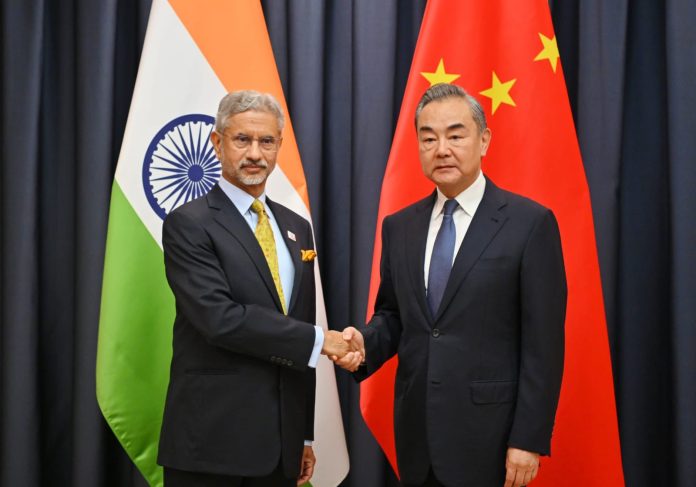
ASTANA, Jul 4 : India on Thursday asked the international community to “isolate and expose” those countries that harbour terrorists, provide safe havens and condone terrorism, underlining that if left unchecked, terrorism can become a major threat to regional and global peace, in a veiled jibe at China and its all-weather ally, Pakistan.
Delivering Prime Minister Narendra Modi’s remarks at the Shanghai Cooperation Organisation (SCO) Council of Heads of State Summit in the Kazakhstan capital Astana, External Affairs Minister S Jaishankar, who was physically present at the meeting, recalled that one of the original goals of the SCO is to combat terrorism.
“Many of us have had our experiences, often originating beyond our borders. Let us be clear that if left unchecked, it can become a major threat to regional and global peace. Terrorism in any form or manifestation cannot be justified or condoned,” he told the summit, which was attended by Chinese President Xi Jinping, Pakistan Prime Minister Shehbaz Sharif and Russian President Vladimir Putin among others.
He said that the international community “must isolate and expose those countries that harbour terrorists, provide safe havens and condone terrorism”, in an apparent reference to Pakistan and its all-weather ally China which has often put on hold on proposals in the United Nations to blacklist the Pakistan-based wanted terrorists.
“Cross-border terrorism requires a decisive response and terrorism financing and recruitment must be resolutely countered. We should also take proactive steps to prevent the spread of radicalisation among our youth,” he said, adding that the joint statement issued during India’s Presidency last year on this subject underlines New Delhi’s shared commitment.
“Delivered India’s statement at the Summit of SCO Council of Heads of States on behalf of PM Shri @narendramodi ji. Thank the leaders present for conveying their best wishes to Prime Minister @narendramodi on his re-election for a third successive term,” Jaishankar posted on X.
Later, Jaishankar delivered Prime Minister Modi’s remarks at the extended format Meeting of the SCO Council of Heads of State where he spoke about challenges, saying terrorism would surely rank foremost for many of us.
“The truth is that it continues to be used by nations as a tool of destabilisation. We have had our own experiences with cross-border terrorism. Let us be clear that terrorism in any form or manifestation cannot be justified or condoned. Harbouring terrorists must be strongly condemned,” he said.
“Cross-border terrorism requires a decisive response and terrorism financing and recruitment must be effectively countered. The SCO must never waver in its commitment. We cannot have double standards in this regard,” he added.
He also said that the SCO extended family shares a commitment to reform the current international order. “This is only possible when those efforts extend to the United Nations and its Security Council. We hope that in the near future, we can develop a strong consensus on the way ahead,” he said.
When it comes to geo-economics, the need of the day is to create multiple, reliable and resilient supply chains, he said, adding that India is open to partnering with others in capacity building, especially nations of the Global South.
Noting that the current global debate is focused on creating the new connectivity linkages that would better serve a rebalanced world, he said if this is to gather serious momentum, it requires the joint efforts of many.
“It must also be respectful of sovereignty and territorial integrity of states and be built on the foundation of non-discriminatory trade and transit rights to neighbours,” he said and pointed out the progress made on Chabahar port in Iran.
He also spoke on Afghanistan, saying “We have a historical relationship between our peoples that is the bedrock of our ties.” India remains sensitive to the needs and aspirations of the Afghan people, he added.
“Enhancing education, training, and capacity-building are key pillars of India’s international cooperation. We are committed to further building on them, be it with the C5 partners, or those of ‘Neighbourhood First’ or the extended neighbourhood,” he said.
“Represented India at the SCO Plus format Meeting in Astana today. Read out PM @narendramodi ‘s statement on the theme ‘Strengthening Multilateral Dialogue – Striving for Sustainable Peace and Development’,” Jaishankar posted on X.
In his earlier speech, Jaishankar underlined that the SCO provides a unique platform to unite people, collaborate, grow and prosper together, practising the millennia-old principle of Vasudhaiva Kutumbakam which means ‘The World is One Family’.
He described the SCO as a principle-based organisation, whose consensus drives the approach of its member states, and said the grouping occupies a “prominent place in our foreign policy”.
He said India shares deep civilizational ties with the people of this region.
“Recognising the centrality of Central Asia to SCO, we have prioritized their interests and aspirations. It is reflected in greater exchanges, projects and activities with them,” he said.
Cooperation in the SCO, for us, has been people-centric, he said, adding that India organised the SCO Millet Food Festival, SCO Film Festival, SCO Surajkund Craft Mela, SCO Think-Tanks Conference, and the International Conference on Shared Buddhist Heritage during its presidency. “We will naturally support similar endeavours by others,” he said.
He also congratulated the Kazakh side for successfully hosting the summit and also conveyed India’s best wishes to China for the next presidency of the SCO.
The minister also expressed “deepest condolences” for the tragic demise of Iranian President Ebrahim Raisi and others in the helicopter crash.
With nine member states — India, Iran, Kazakhstan, China, Kyrgyz, Pakistan, Russia, Tajikistan and Uzbekistan – the Beijing-based SCO has emerged as an influential economic and security bloc and one of the largest trans-regional international organisations. Belarus joined as the 10th member.
Kazakhstan is hosting the summit in its capacity as the current chair of the grouping. (PTI)

